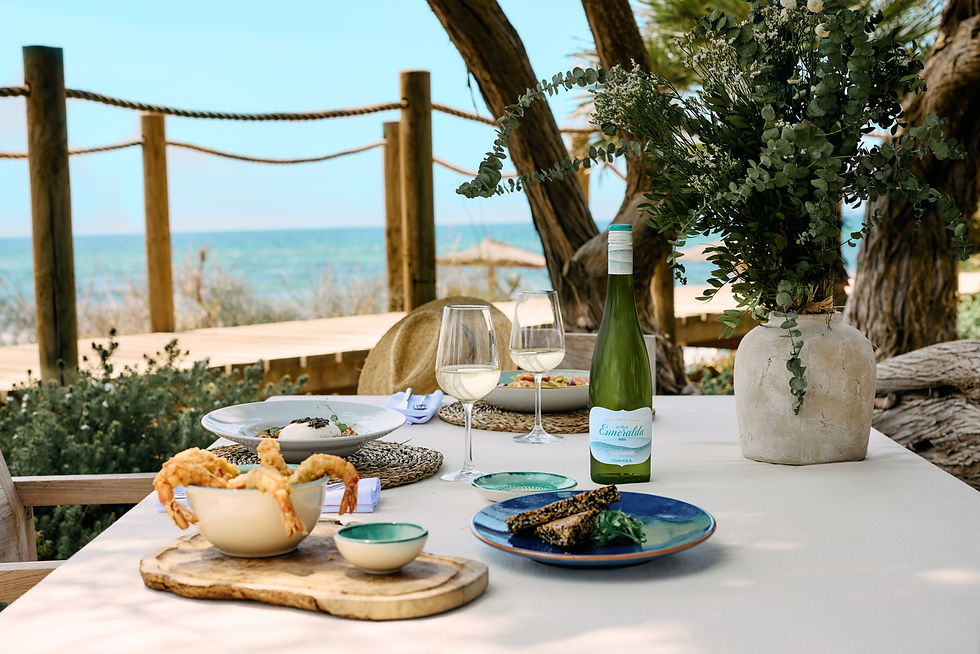The Essential Guide to Serving Wine at the Right Temperature
- Angela Aiello
- Apr 1, 2025
- 4 min read
Updated: Apr 9, 2025
Why Serving Wine at the Right Temperature Isn’t Just Fancy—It’s Essential and degrees matter

Let’s be honest - Most of us have poured a glass of wine straight from wherever it was—whether that’s a warm countertop or the back of a chilly fridge—and called it a night. But if you’ve ever wondered why your wine didn’t taste quite as magical as you hoped, the temperature might be the unsung culprit.
Turns out, serving wine at the right temperature isn’t just for sommeliers or the fine-dining elite. It’s a simple, science-backed way to bring out the best in your bottle—and seriously upgrade your sipping experience. Serving wine at the proper temperature is crucial because temperature significantly impacts the wine's aroma, flavor, and overall balance.
Wakefield Wines from South Australia has taken the guesswork out of what temperature your bottle is. A global initiative, on each of their Estate wine bottles, there is a temperature thermometer telling you what temperature your wine is at. One of the first families of wine in Australia and still a family-owned winery - Justin Taylor came to Toronto to show us that ‘degrees really matter’ when it comes to serving wine at it’s best.
For three generations, Wakefield wines have crafted great Australian wines in the Clare Valley, South Australia and they are committed to innovation, sustainability, and giving back. Not only is Wakefield Wines a certified member of Sustainable Winegrowing Australia, but they are also incredibly focused on preserving biodiversity at the winery. They also give back to Project Seahorse, as Seahorses are a main winery symbol after seahorse fossils were found while building the winery. Wakefield wines have been at the LCBO for a long time, and the newest addition in April 2025 is the Sauvignon Blanc, which just won Best Australian White in show at the Mundus Vini awards. All Wakefield wines are launching their new vintages this spring, and are worth stalking up on.
Temperature Affects Taste—Big Time
Wine is a complex symphony of aromas, flavors, and textures. Serve it too warm or too cold, and it’s like playing a piano with half the keys muted.
Too cold? The flavors get locked up. You’ll mute those fruity, floral, or spicy notes, and the wine may come off as dull or overly acidic.
Too warm? The alcohol becomes more pronounced, making the wine taste flat, flabby, or overly boozy.
In short: wine at the wrong temp is like coffee that’s gone lukewarm—it’s technically drinkable, but you’re missing out on all the good stuff.

So What’s the “Right” Temperature?
Glad you asked! Different wines shine at different temps. Here’s a cheat sheet:
Sparkling Wines (Champagne, Prosecco, Cava): Very chilled (38–45°F / 3–7°C)
The cooler temp keeps bubbles tight and crisp, perfect for a refreshing, celebratory vibe.
White Wines (Sauvignon Blanc, Pinot Grigio): Chilled (45–50°F / 6–12°C)
Keeps acidity zesty and aromas bright. Think crisp, not icy.
Full-bodied Whites (Chardonnay, Viognier): Slightly cool (50–55°F / 10–13°C)
Helps showcase richer textures and complex flavors.
Light Reds (Pinot Noir, Gamay): Cool (55–60°F / 13–16°C)
A slight chill boosts fruitiness and keeps tannins smooth.
Full-bodied Reds (Cabernet Sauvignon, Syrah): Cellar temp (60–65°F / 16–18°C)
Just below room temp is the sweet spot—warm enough to open up aromas, cool enough to stay balanced
SWG TIP: Most “room temperature” wine is too warm! Unless your room happens to be a 65°F wine cellar, a short chill in the fridge will do wonders to the enjoyment of your fermented juice.

It’s Not Just for Snobs
Let’s bust a myth: serving wine at the right temperature isn’t pretentious—it’s practical. You don’t need a wine fridge or a thermometer collection. A regular fridge and a bit of timing go a long way:
TIPS TO ADJUST A WINE TEMPERATURE
To Cool Wine Quickly:
Ice Bath (Fastest Method - 15-20 min)
Fill a bucket with ice, water, and a handful of salt (lowers freezing point).
Submerge the bottle, rotating it every few minutes.
Freezer (15 min for whites, 10 min for reds)
Lay the bottle flat in the freezer for a quicker chill.
Set a timer! Forgetting it can lead to an exploded bottle.
Wrap in a Wet Towel + Freezer (10-15 min)
Wrap the bottle in a damp paper towel before placing it in the freezer. The moisture speeds up cooling.
Refrigerator (2 hours for whites, 30-45 min for reds)
A slower method, but great for planning ahead.
Wine Chiller or Cooling Sleeve (15-20 min)
To Warm Wine Up:
Room Temperature Resting (15-30 min)
Take red wine out of the fridge about 30 minutes before serving.
White wine can warm up in 10-15 minutes if it’s too cold.
Hold the Glass in Your Hands (A Few Minutes)
The warmth from your hands can slightly raise the temperature of the wine in your glass.
Warm Water Bath (5-10 min)
Place the bottle in a bowl of lukewarm (not hot) water.
Do not use hot water, as rapid temperature changes can affect the wine’s structure.
Decanting in a Warm Room (For Reds)
Pouring the wine into a decanter can help raise the temperature slightly while also aerating it.

These wines are available at the LCBO
The Bottom Line
Wine is meant to be enjoyed and be a super pleasurable experience, and serving it at the right temperature helps it show up as its best self—just like you do when you’re well-rested and dressed for the occasion. So whether it’s a Tuesday night pour or a weekend dinner party, give your wine the temp and respect it deserves.
Here is a list of the Wakefield Wines now available at the LCBO.
LCBO # | Wine | Retail | Notes |
166942 | $17.95 | Vintages release April 12, 2025 | |
711556 | $17.95 | LCBO Essentials | |
744235 | $19.95 | Vintages release April 12, 2025 | |
943787 | $19.95 | LCBO Essentials |
Because when it comes to wine, a little chill goes a long way. If you don’t believe me! Watch our exclusive segment on CHCH TV Morning Live segment below.








Comments